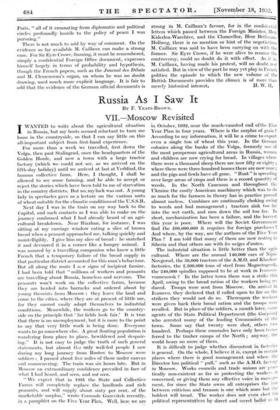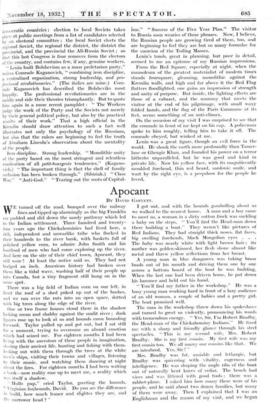Russia As I Saw It
BY F. YEATS-BROWN.
VII.—Moscow Revisited
IWANTED to write about the agricultural situation 4 in Russia, but my hosts seemed reluctant to turn me loose in the countryside, so that I can say little on this all-important subject from first-hand experience.
For more than a week we travelled, first down the Volga, then past Stalingrad, once the headquarters of the Golden Horde, and now a town with a large tractor factory (which we could not see, as we arrived on the fifth-day holiday) until we arrived at last at Verbliud, the famous collective farm. Here, I thought, I shall be allowed to see some farming, and be able to accept or reject the stories which have been told to me of starvation in the country districts. But no, my luck was out. A young lady in spectacles gave us a lecture on the various sorts of wheat suitable for the climatic conditions of the U.S.S.R.
Next day I was in the train on my way back to the Capital, and such contacts as I was able to make on the journey confirmed what I had already heard of an agri- cultural breakdown. Near Riazhan, for instance, I was sitting at my carriage window eating a slice of brown bread when a peasant approached me, talking quickly and unintelligibly. I give him my. slice of bread : he snatched it and devoured it in a corner like a hungry animal. I was assured by a travelling companion who knew a little French that a temporary failure of the bread supply in that particular district accounted for this man's behaviour. But all along the route I st.w signs of incipient famine. I had been told that "millions of workers and peasants are travelling about Russia, homeless and nervous. The peasants won't work on the collective farms, because they are herded into barracks and ordered about by young theorists from Moscow : they leave the land and come to the cities, where they are at present of little use, for they cannot easily adapt themselves to industrial conditions. Meanwhile, the workers go to the country- side on the principle that' far fields look fair.' It is true that there is no unemployment, but it is more to the point to say that very little work is being done. Everyone wants to go somewhere else. A great floating population is wandering from place to place, bewildered and despair- ing." It is not easy to judge the truth of such general statements, but almost tla: only well-fed people I saw during my long journey from Rostov to Moscow were soldiers I passed about five miles of them under canvas• and manoeuvring. The train was .six hours late. But in Moscow an extraordinary confidence prevailed in face of. what I.-hail heard, and seen, and not seen.
"We expect that in 1931 the State and Collective Farms will completely replace the landlords and .rich peasants, and will supply about sixty per cent. of the marketable surplus," wrote Comrade Gurevitch recently, in a pamphlet on the Five Year Plan.. Well, here we are in October, 1932, near the much-vaunted end of the Five Year Plan in four years. Where is the surplus of grain ? According to my information, it will be a crime to export even a single ton of wheat this year. In the German colonies along the banks of the Volga, formerly one of the most prosperous agricultural areas in Russia, women and children are now crying for bread. In villages where there were a thousand sheep there are now fifty or eighty ; where there were three hundred horses there are now none; and the pigs and fowls have all gone. " Rust " is spreading over large areas of crops and there is a record quantity of weeds. In the North Caucasus and throughout the Ukraine the costly American machinery which was to do so much for the farmers in theory has in practice proved almost useless. Combines are continually choking owing to weeds and bad management ; tractors sink too far into the wet earth, and ram down the soil too far. In short, mechanization has been a failure, and the harvest this year is poor. Where will the Soviet Government find the £60,000,000 it requires for foreign purchases? And where, by the way, are the authors of the Five Year Plan ? I am told that many of them are now resting in Siberia and that others are with lee neiges d'antan.
The industrial situation is little better than the agri- cultural. Where are the annual 140,000 cars of Nijni- Novgorod, the 50,000 tractors of the A.M.O. and Kharkov factories, the 2,500,000 tons of steel from Magnetogoisk, the 240,000 spindles supposed to be at work in Ivanovo- voznesensk ? In the latter town there was a strike this April, owing to the bread ration of the workers being re- duced. Troops were sent from Moscow. On arrival in Ivanovo, they declared that if called upon to fire on the strikers they would not do so. Thereupon the workers were given back their bread ration and the troops were recalled. But in place of the soldiers, .a month later, came agents of the State . Political Department (the .Guepeon) who arrested many. of the leading_ Communists of the town. Some say that twenty were shot, , others two hundred. Perhaps these comrades have only been trans- ferred to the timber camps of the North ; anyway, the world hears no more of them. . It is difficult to judge whether discontent. in factories is general. On the whole,. I believe it is, .except in certain places where there is good management. and Where the Director has political pull," such as the A.M.O. factory in Moscow. Works councils and .trade unions are prac- tically non-existent as far is protecting the workers is concerned, or giving them any effective voice in manage- ment, for since the State owns all -enterprises the line between criticism and treason is one which none but the , , . . . . . boldest will tread.. The worker does not even elect his political representatives by direct and secret:ballot AC democratic .couritries. : election to local Soviets takes place at public meetings from a list of candidates selected hr an electoral committee : the local Soviet elects the regional Soviet, the regional the district, the district the provincial, and the provincial the All-Russia: Soviet ; so that this last Congress is four removes from the electors of the country, and contains few, if any, genuine workers.
"Lenin built Bolshevism as a mass proletarian liarty," writes Comrade Kaganovich, "combining iron 'discipline, a centralized organization, strong leadership, and pro- fessional revolutionaries." (The italics are mine.) Com- rade Kaganovich has described the Bolsheviks most happily. The professional revolutionaries are in the saddle and ride their theories triumphantly. But to quote him again in a more recent pamphlet : " The Workers judge the work of the Party and the Soviets not merely by their general political policy, but also by the practical results of their work." That a high official in the Kremlin Should draw attention to such a fact well illustrates not only the psychology of the Russians, but also that the rulers are beginning to feel the truth of Abraham Lincoln's observation about the mentality of the people.
Iron discipline. Strong leadership. "Monolithic unity of the party based on the most stringent and relentless eradication of all petit-bourgeois tendencies." (Kagano- rich.) "The important thing is that the shell of family seclusion has been broken through." (Sibiriak.) "Class War." "Anti-God." "Tearing out the roots of Capital- IsM." "Success of the Five Year Plan." The visitor to Russia soon wearies of these phrases. Now, I believe, the Russian people are growing tired of them, too, and are beginning to feel they are but so many formulae for the coercion of the Toiling Masses.
Lenin's tomb, great in planning, but poor in detail, seemed to me an epitome of my Russian impressions.
From the Red Square, especially at night, when the mausoleum of the greatest materialist of modern times stands foursquare, gleaming, monolithic against the Kremlin walls, and high and far above it the Red Flag flutters floodlighted, one gains an impression of strength and unity of purpose. But inside, the lighting effects are those of a cabaret, and the mummy that meets the visitor at the end of his pilgrimage, with small waxy folded hands, and the flag of the Paris Commune at its feet, seems something of an anti-climax.
On the occasion of my visit I was surprised to see that the comrade in front of me kept on his cap. A policeman spoke to him roughly, telling him to take it off. The comrade obeyed, but winked at me.
Lenin was a great figure, though an evil force in the world. He shook the earth more profoundly than Tamer- lane or Ghengiz Khan, and founded his power on a terror hitherto unparalleled, but he was good and kind in private life. Now his yellow face, with its magnificently moulded forehead, thin red beard, sardonic smile, and wart by the right eye, is a peepshow for the people he loved.

































































 Previous page
Previous page